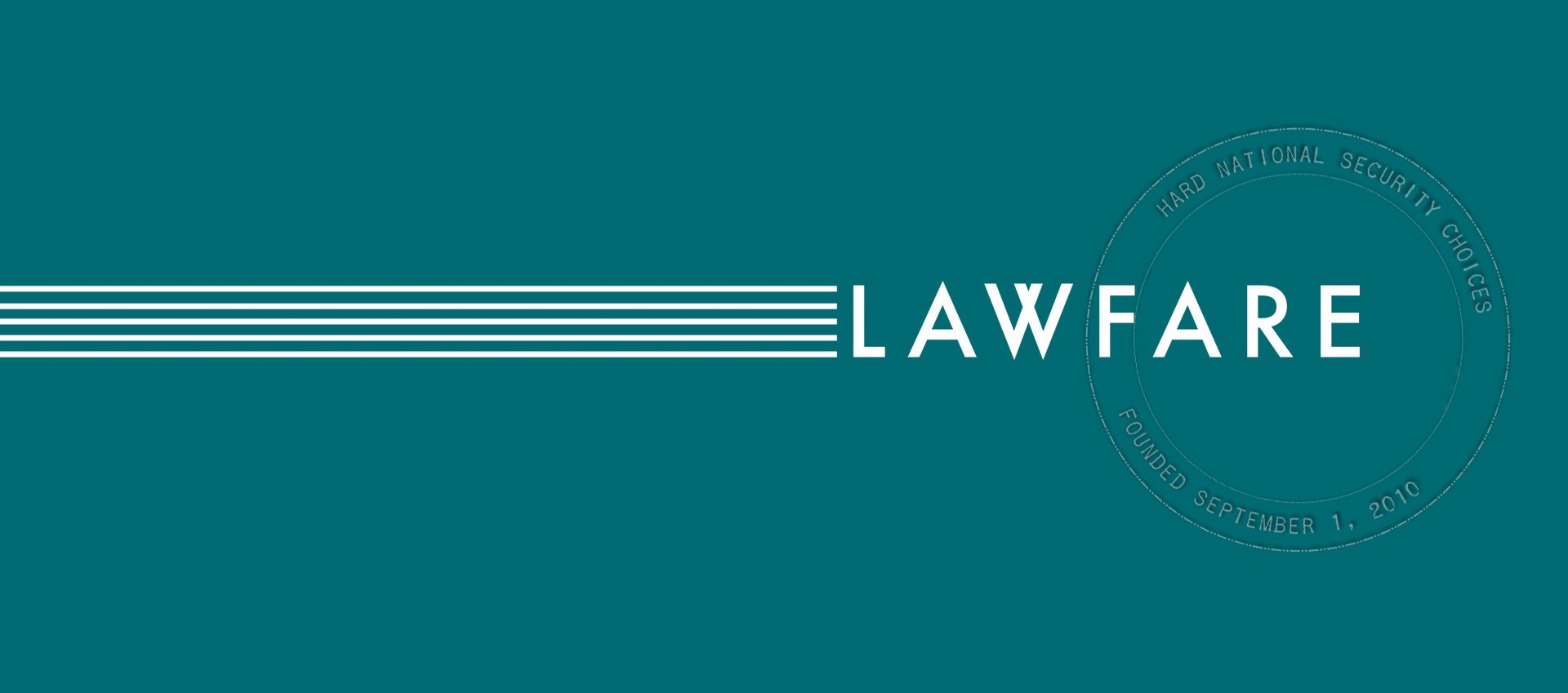The Week That Was: All of Lawfare in One Post

Published by The Lawfare Institute
in Cooperation With

Anna Bower summarized the previously unreleased Georgia Bureau of Investigation’s report into allegations of crimes related to unauthorized access to voting equipment in Coffee County.
Beau Tremitiere and Aisha Woodward discussed the possibility of a contingent election in 2024 and the numerous crisis scenarios it could precipitate.
On the Lawfare Podcast, Scott R. Anderson sat down with Tremitiere and Woodward to discuss their piece in Lawfare. They discussed how a contingent election would work, how it might end up subverting the democratic process, and what alternatives might be out there for those less than content with the two-party status quo:
On the Lawfare Podcast, Benjamin Wittes and Anderson discussed what could happen if a president gets convicted and then gets elected, and how the system might respond if it’s a federal case, if it’s a state case, if the case is pending, and if the case is already wrapped up:
On the Lawfare Podcast, Alan Rozenshtein shared audio from a panel at the University of Minnesota Law School’s conference on Section 3 of the 14th Amendment and the 2024 election. In the episode, Larry Jacobs sat down with Julia Azari, Ilya Somin, and Eric Segall to discuss the political implications of various Section 3 cases:
Rozenshtein also shared a livestream of the conference held by the University of Minnesota Law School bringing together legal and policy experts to discuss the lawsuits seeking to disqualify former President Donald Trump from the 2024 presidential ballot.
Caleb Benjamin and Hyemin Han shared that Lawfare has a new page to track ongoing Section 3 of the 14th Amendment disqualification litigation against Trump. The page can be found here.
On this week’s episode of “Lawfare Live: Trump’s Trials and Tribulations,” Wittes sat down with Bower, Josh Gerstein, and Roger Parloff to discuss Section 3 litigation against Trump, a hearing in the Mar-a-Lago classified documents case, Trump’s motion to stay in the D.C. District court case, and more:
On the Lawfare Podcast, Wittes sat down with Bower, Quinta Jurecic, and Parloff to discuss the pleas that have happened and that are coming in Fulton County, Trump’s motions to dismiss in D.C. District Court, and more:
Molly E. Reynolds discussed new Speaker of the House Mike Johnson’s (R-La.) approach to politically contentious issues such as aid to Ukraine and Israel.
Jurecic sat down with Dan Richman to discuss the charges against Sen. Bob Menendez (R-N.J.), the Supreme Court decision in McDonnell v. United States that makes prosecuting corruption cases more difficult, and Richman’s recent piece in Lawfare about McDonnell and Menendez.
Cameron F. Kerry discussed how the U.S. government could codify existing safeguards for intelligence collection on foreign nationals in a reauthorization of FISA at the end of the year.
Aimee Nishimura discussed the Department of Defense’s interest in deepfake technology and argued the department should label deepfakes as human subjects research (HSR) so they are subject to greater protections and review procedures.
Matthew Tokson discussed law enforcement purchases of sensitive personal data, arguing they violate the Fourth Amendment and should require a warrant.
Justin Sherman discussed the links between people search data brokers—companies that aggregate and sell publicly available information—and stalking and gendered violence. He argued lawmakers must pass regulation limiting the risks stemming from the digitization of records while safeguarding access to records for reporting and other watchdog functions.
Joshua Wallin and Andrew Reddie discussed the growing role AI might play in future conflicts and the related escalation challenges, and argued for the creation of multistakeholder governance bodies to ensure international cooperation on AI.
Scott Shapiro, Sean O’Brien, and Wittes shared the seventh class in Lawfare’s Hacking and Cybersecurity course, entitled, “Encryption.” They covered the basics of encryption, the differences between transition control protocol and user datagram protocol, symmetric encryption, and more.
Matt Gluck discussed outgoing UN Special Rapporteur on Human Rights and Counterterrorism Fionnuala Ní Aoláin’s July report detailing the findings from her visit to detention camps, prisons, and rehabilitation facilities in northeastern Syria.
In an installment of Lawfare’s Foreign Policy Essay series, Benjamin Allison examined the risk Hezbollah’s precision-guided munitions pose to Israel and its civilian infrastructure.
On the Lawfare Podcast, Han sat down with Anderson, Dan Byman, and Ghaith al-Omari to discuss how the West Bank fits into the Israel-Hamas War in light of increased Israeli settler violence since the Oct. 7 attack by Hamas. They discussed the international law that currently governs the rules of engagement in the West Bank, the political responses of the Israeli government and other Arab states to developments in the West Bank, and how West Bank dynamics will impact the broader outcomes of the Israel-Hamas war:
On Rational Security, Anderson, Jurecic, and Rozenshtein sat down with Eugenia Lostri to discuss the Biden administration’s Executive Order on AI, easing of sanctions on Venezuela in exchange for the release of political prisoners and a promise to hold competitive elections, the start of new Speaker of the House Mike Johnson’s (R-La.) tenure, and more:
In another installment of Lawfare’s Foreign Policy Essay series, Gigi Kwik Gronvall argued that new oversight rules proposed by the Department of Health and Human Services on research conducted on viruses and bacteria that cause human disease would stifle U.S. research.
On Chatter, David Priess sat down with Matthew Parker to discuss his new book on the British Empire, “One Fine Day,” how the First World War affected how colonized people viewed imperial rule, the emergence of social anthropology and its impact on racist views underlying colonialism, and more:
And Han and Katherine Pompilio shared that Lawfare is accepting Spring 2024 internship applications. The application period closes on Nov. 5, 2023.
And that was the week that was.

